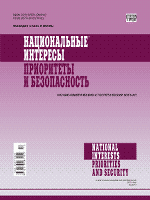Abstracting and IndexingÐÈÍÖReferativny Zhurnal VINITI RAS Worldcat LCCN Permalink Google Scholar Online availableEastvieweLIBRARY.RU Biblioclub |
The significance of humanitarian cooperation of Russia and China with their Central Asian partners in the framework of Shanghai Cooperation Organization
Available online: 20 August 2014 Subject Heading: INTERNATIONAL COOPERATION JEL Classification: Pages: 35-49
The article shows to what extend the humanitarian dimension of contemporary international rela-tions (IR) became influential. The authors make an attempt to warn against the underestimation of the humanitarian factor in the global arena. That underestimation may lead not only to a varie-ty of problems, which hinder the development of the bilateral and multilateral relations of IR-subjects, but also may create some difficulties in other levels of their interaction - political, eco-nomic and defensive ones, etc. The article presents authors' perception of the "soft power" and the place of humanitarian cooperation in the "soft power" concept, and also the paper analyzes the strong points and weaknesses of the humanitarian cooperation of Russia, China and some other countries - the SCO member-states. The paper considers the problems, which impede the promotion of the Russia's positive image in the Central Asian region countries. The authors pro-vide an analysis of the experience of the Russian universities' branches in the Central Asian re-gional countries, which demonstrate the growing need in expanding of the network of schools in the Central Asia with the Russian educational curriculum. The authors also examine the features of the Chinese modern "soft power" tactics in regard to the Central Asian countries of the SCO segment. The paper also provides a number of recommendations for the authorities, which bear responsibility for promoting of the Russia's humanitarian cooperation with the foreign countries in such areas as cultural dialogue, health care, scientific research and education, information and ecology as well as, cooperation in an area of the elimination and management of the natural and the man-made disasters. The authors provide the directions of the further interaction taking into account the capacities and interests, which concern not only Russia, but also its strategic partners - China and the states of the Central Asia. The main conclusions of the article are as follows: a) by its significance, the current humanitarian activities we may put on a par with the foreign policy and the economic efforts of a state, aimed at safeguarding of the state's interests abroad; b) by the implementation, the Russian-Chinese joint humanitarian initiatives became the new humani-tarian "breakthrough", which may enhance not only the "soft power" positions, but also the over-all potential of the SCO as well. Keywords: humanitarian cooperation, soft power, culture, education, non-governmental or-ganizations (NGO), Russia, China, USA, Central Asia References:
|
ISSN 2311-875X (Online)
|
|








